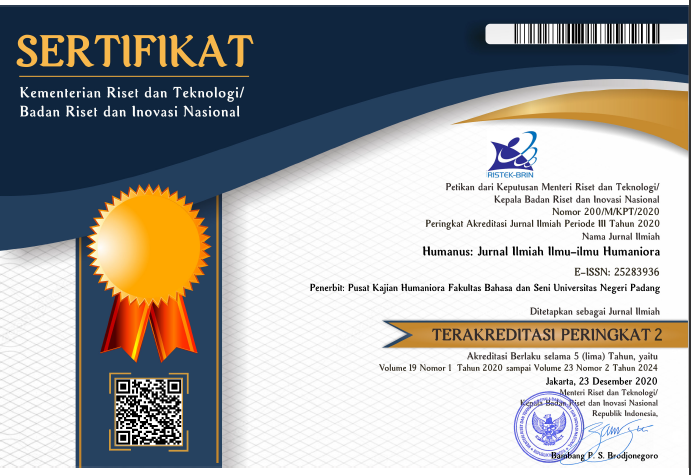ECRANISATION STUDY: FROM NOVEL TO FILM DILAN 1990
 ), Sarwiji Suwandi(2), Retno Winarni(3),
), Sarwiji Suwandi(2), Retno Winarni(3), (1) UNS
(2) Pascasarjana UNS
(3) Pascasarjana UNS
 Corresponding Author
Corresponding Author
Copyright (c) 2018 Humanus
DOI : https://doi.org/10.24036/humanus.v17i2.100389
Full Text:
 Language : Ind
Language : Ind
Abstract
The purpose of this study was to describe the form of ecranitation of novels into films the Dilan 1990 by Pidi Baiq and Fajar Bustami. Ecranisation is a study in the form of transfer of vehicles or transformation from a work of art into film. The transformation in this study is different from the form of presentation. This research used qualitative using the method of content analysis. The analysis of the research was carried out in an ecranisation approach. Data were collected through library studies and sources of data from Dilan 1990 novels and films. The result of the study showed the realization of ecranisation novel and film in the 190 Dilan with new shortcomings additions and variation from the content of the story and the constituent elements of the story.
Keyword: Ecranisation, Dilan 1990, Literature, film, novel
Abstrak
Tujuan penelitian ini adalah untuk mendeskripsikan wujud ekranisasi dalam novel ke film Dilan 1990 karya Pidi Paiq dan Fajar Bustami. Ekranisasi merupakan kajian yang berupa alih wahana atau transformasi dari sebuah karya seni ke dalam bentuk film. Transformasi dalam kajian ini berbeda bentuk penyajiannya. Penelitian yang digunakan adalah kualitatif dengan menggunakan metode analisis isi. Analisis penelitian dilakukan pendekatan ekranisasi. Data dikumpulkan melalui studi pustaka, dan sumber data dari novel dan film Dilan 1990. Hasil penelitian menunjukkan wujud ekranisasi novel ke film Dilan 1990 adanya penciutan, penambahan, dan variasi baru baik dari isi cerita maupun unsur pembentuk ceritanya.
Kata kunci: Ekranisasi, Dilan 1990, Sastra, film, novel
Keywords
References
Ayan, M., & Çubukcu, F. (2009). Adapting Americas in novels adapted for films. Buletinul Universităţii Petrol – Gaze Din Ploieşti, LXI(2), 51–60. Retrieved from http://content.ebscohost.com/ContentServer.asp?T=P&P=AN&K=47028557&S=R&D=a9h&EbscoContent=dGJyMMTo50Sep644y9fwOLCmr0%2Bep65Ssqa4TK6WxWXSContentCustomer=dGJyMPGptkyvq7ZJuePfgeyx44Dt6fIA
Baiq, P. (2014). Dilan 1990. Bandung: PT Mizan Pustaka.
Bane, C. (2006). Viewing novels, reading films Stanley Kubrick and the art of adaptation as interpretation. Disertasi: Louisiana State University.
Bazin, A. (2000). Adaptation, or the cinema as digest. Film Adaptation, 19–27.
Bluestone, G. (1956). George bluestone. university of California Press.
Chatman, S. (1990). Story and discourse: Narrative structure in fiction and film. Ithaca and London: Cornell University Press.
Eneste, P. (1991). Novel dan film (cetakan 1). Flores Indonesia: Nusa Indah.
Hawthrone, K. N. (2012). Transformasi novel ke film kajian ekranisasi terhadap the Scarlet Letter.
Hutcheon, L. (2006). A theory of adaptation. New york and London: Routledge Taylor & Francis Group.
Isaacs. (1970). Fiction into film: A walk in the spring rain. New York: A Delta Book.
Isnaniah, S. (2015). Ketika cinta bertasbih transformasi novel ke film. Kawistara, 23(1), 23–35.
Istadiyantha. (2017). Ecranisation from textual tradition to cinema: The infidelity against the values of literary writing? Humanus, 16(1), 83–92. https://doi.org/10.24036/jh.v16i1.7961
Alqadi, K. (2005). Literature and cinema. The Cambridge History of Twentieth-Century English Literature, 3(1), 335–358. https://doi.org/10.1017/CHOL9780521820776.021
Krisspendroff. (2004). Reseach Methods Qualitative Approaches. Lanham, New York, Toronto Oxford: AltaMira Press.
Kristanto. (2005). Katalog Film Indonesia 1926-2005. Jakarta: Penerbit Nalar.
Milles, M. B. . H. M. A. (1994). Qualitative Data Analysis.An Expanded Sourcebook (sage). Thousand Oaks.
Nurgiyantoro, B. (2016). Transformasi Cerita Wayang dalam Novel Amba dan Pulang. Litera: Jurnal Penelitian Bahasa, Sastra, Dan Pengajarannya, 15(2), 201. https://doi.org/10.21831/ltr.v15i2.11823
Perdikaki, K. (2018). Film adaptation as the interface between creative translation and cultural transformation: The case of Baz Luhrmann’s The Great Gatsby. The Journal of Specialised Translation, (29), 169–187.
Polan, D. (2013). Film review the “great American novel” as pop-up book: Baz Luhrmann’s the Great Gatsby. Adaptation. https://doi.org/10.1093/adaptation/apt018
Ratna, N. (2008). Teori , Metode, dan Teknik Penelitian Sastra. Denpasar: PUSTAKA PELAJAR.
Saputra, H. S. P. (2009). Transformasi Lintas Genre Dari Novel Ke Film Dari Film ke Novel. Humaniora, 21(1), 41–45.
Stratyner, L. and J. R. K. (2007). Fantasy fiction into film. Jefferson, North Carolina and London: Mc.
Sugiyono. (2012). Memahami penelitian kualitatif. Bandung: Alfadeta.
Sutopo, H. B. (2002). Metodelogi penelitian kualitatif. Surakarta: UNS Press.
Willeams, G. (2015). Adaptation policy : Film policy and adaptations in Flanders ( 1964-2002 ). Literature Film Quarterly, 43(1), 66–76.
Woodrich, C. A. (2016). Implikasi metodelogis dari teori ekranisasi George Bluestone. Lingua Idea (Linguistik,sastra BUdaya), 7(1), 1–4.
Woodrich, C. A. (2017). Enkranisasi awal: Bringing novels to the silver screen in the Dutch East Indies. Yogyakarta: Gadjah Mada University Press.
 Article Metrics
Article Metrics
 Abstract Views : 2701 times
Abstract Views : 2701 times
 PDF Downloaded : 790 times
PDF Downloaded : 790 times
Refbacks
- There are currently no refbacks.
Copyright (c) 2018 Humanus

This work is licensed under a Creative Commons Attribution-NonCommercial 4.0 International License.










